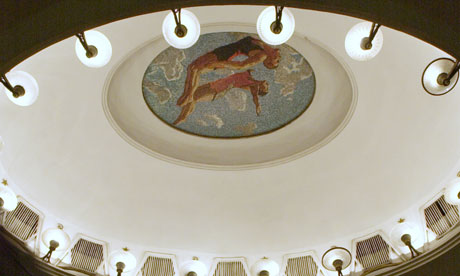
Antonina Pirozhkova, who has died aged 101, was the leading female engineer during the construction of the Moscow metro in the 1930s. But she had an even bigger role as first the wife of the writer Isaac Babel and, following his death in 1940, the custodian of his legacy.
Pirozhkova was born in the Siberian village of Krasny Yar and showed early academic ability, helping her widowed mother at the age of 14 by tutoring other children in mathematics. By the age of 21 she was a qualified engineer and two years later she moved to Moscow. She was given a job by the newly formed Metrostroi company and helped design some of the most famous "underground palaces" in the Soviet capital, including the stations Mayakovskaya, Paveletskaya, Kievskaya, Arbatskaya and Ploshchad Revolyutsii. In 1964 she published the standard Soviet engineering textbook, Tunnels and Metros.
Pirozhkova met Babel in 1932 and they formed a relationship that lasted seven years. Their daughter, Lidiya, was born in 1937. As with many Soviet couples of the era, their marriage did not depend on a formal declaration or ceremony. The Soviet authorities later recognised Pirozhkova as Babel's widow and heir.
Outwardly it was an unusual pairing: a young Siberian engineer and a bespectacled Jewish writer, who was 15 years older and already had a daughter by his first wife and a son from a relationship with the actress Tamara Kashirina. Pirozhkova was an anchor for Babel as he faced political and artistic isolation. The couple disliked the Moscow literary scene and Babel was proud of his partner's highly skilled job. He turned down invitations on her behalf: "She is a working woman; she has no time."
In 1924 Babel had been hailed by Pravda as "the rising star of our literature". Saying he had "no imagination", he chose to experience the new Soviet era at first hand, living in Odessa's gangster neighbourhood, the Moldavanka, and riding with General Semyon Budyonny's Red Cavalry in the Soviet-Polish war in 1920. This was the material for the original and phenomenally successful short-story collections Odessa Stories (1923) and Red Cavalry (1926). But by the time he met Pirozhkova, his vivid modernist style and natural nonconformism were much less welcomed and, as he himself sardonically put it, he began cultivating "the genre of silence".
As the Stalinist repression worsened, Babel characteristically tried to play by different rules. He kept up his links with his first family, in France, had an Austrian lodger and rashly attended a salon hosted by Yevgenia Yezhova, the wife of Nikolai Yezhov, head of the secret police, the People's Commissariat for Internal Affairs (the NKVD, which became the KGB). His luck finally ran out on the night of 15 May 1939, when he was arrested on trumped-up charges (spying for foreign powers, being a Trotskyist agent) at his dacha in Peredelkino outside Moscow. Babel and Pirozhkova were driven into the city and parted at the gates of the Lubyanka, the headquarters of the secret police.
Babel was shot on 27 January 1940, although his death was confirmed to Pirozhkova only in 1954 and the correct date was concealed from her for another 30 years. Pirozhkova was isolated, although allowed to keep her job. As an evacuee in the Black Sea region of Abkhazia with her daughter during the second world war, she ran the engineering team building the railway tunnels there.
Pirozhkova later said with regret: "From the beginning Babel frightened me and told me I shouldn't read what had not been finished. He said: 'I'll write it and then read it to you myself.' So even when something lay open and I passed the desk, I tried not to look at it." She began a campaign to reclaim a decade's worth of Babel's unpublished work, which had been confiscated during his arrest.
In 1989 the literary researcher Vitaly Shentalinsky discovered that the NKVD had seized 15 folders of manuscripts, 18 notebooks and pads, 517 letters, postcards and telegrams and 245 various loose sheets of paper from his apartment alone. They included all Babel's letters to Pirozhkova. In 1987 two officers from the Lubyanka visited her and told her that all of this had been burned. It was later suggested that this was not true.
In 1965 Pirozhkova retired to devote herself to Babel's legacy. In 1972 she oversaw the publication of the first reminiscences about him by writers such as Ilya Ehrenburg and Konstantin Paustovsky and finally (in 1990) a two-volume edition of Babel's collected works.
Pirozhkova's own memoir of her life with Babel, By His Side, was published abroad after the end of the Soviet Union, with a Russian-language edition finally coming out in uncensored form in 2001. Her reminiscences about some of the remarkable contemporaries she had known, such as the film director Sergei Eisenstein, remained unpublished at the time of her death.
In 1996, Pirozhkova emigrated to the US, where she lived with Lidiya and her grandson, Andrei, who survive her.
• Antonina Nikolayevna Pirozhkova, engineer and writer, born 1 July 1909; died 12 September 2010

